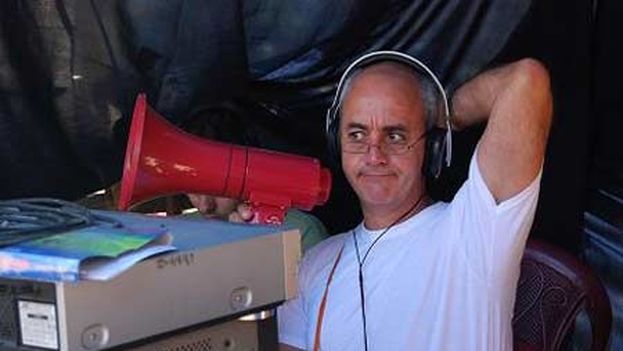I am also very fond of Pablo Picasso’s idea: “rather than search, find” on the path to art. Thus, it excites me, but much more, the act of aesthetic genesis itself, far beyond the finished work. Also, I always try, even at the abuse of the plural of modesty, contrasting it to a prolonged and ever more frequent and excessive “I” that is now habitual. Abundant, in the discourses that for so long have flooded every branch of thinking in our country, above all in criticism. And especially in politics.
But I am compelled to answer some “hasty” notes (also induced, commanded and/or dictated, which explains in some way their “precipitation”) regarding the [Havana] premier, on 4 July, of Eugene Ionesco’s play The King is Dying**, by our collective, El Ingenio.
I applaud your seriousness in researching my work and I admire the respect that you profess to me, despite the fact that, evidently, you fight, like the rest of your operators, in favor of maintaining intact your working life, or what is called, “looking after your job.” I understand. continue reading
If I remember correctly, you were also at the meeting where I was called in front of the “top brass” of the National Council for the Performing Arts to communicate to me the suspension of the season. And now I have no doubt that many of the views expressed in the letter respond in a personal way to the signals, although with harsher epithets such as “treason” and “political pamphlet,” from Gisela Gonzalez herself, who serves as President of Theater Arts in Cuba.
I do not know which came first. If it was hers or yours.
Raul could say it in his speech, but the theater, no. We were not authorized to expose it. Raul is applauded of course. Who dares to contradict him?
But either way, its deep and accelerated study comes to explain a little more the absurd and unintelligible initial note, suddenly appearing in CUBARTE, about the changes in programming at the Tito Junco Hall of the Bertolt Brecht Cultural Center, which did nothing more than hide a blatant censorship.
However you are smarter and saner. Your analysis is respectable, although conditioned.
And I am, believe me, very grateful to the attempt to elucidate a little all the indecipherable nebula that we try to stage. Your praise is also gratifying, your eulogies and superlatives, which I humbly hope to deserve.
However, it is likewise a little unfair and inexact, although entirely within your rights as a critic – not as a researcher – to offer an opinion in such a closed and categorical way about an artistic phenomenon, taking into account, only, your work as a screener.
In Art, as in every other subjective display, or even in medicine that is backed by science, that which could be good for you (all of you) not necessarily because it is for others.
Or for us, the others.
If any of you had attended the play on Sunday, you would have found another moment that, although essentially the same, wasn’t that staged on Saturday. I often tell my friends that it is better to attend the last evenings, when the actors and technicians have already tested, and even more savored, an experience that is enriched and transformed with each delivery.
Especially when the work staged by our collective depends heavily on the interaction with the audience to which your commentary refers. And where, in addition to the “mockery” to which you (or all of you) alluded to, there is a declared intention to rescue a very Cuban form of theater, quasi-lost or misplaced-censored-by-force-for-more-than-50-years, but that characterized the entire Cuban vernacular theater with the regular practice of political satire as a commentary on what happens in our country.
Shameless, excessive, irreverent (which is not the same is disrespectful), iconoclastic, rebellious, and sometimes even vulgar or profane, which you do not know, floods our countryside and cities. And it seems to be the language generated by the “New Man” that is forged in this imprecise society imposed on us.
Our intent with this staging was to talk about the resistance to change. Scathing obstinacy that today is made manifest again with the erratic decision of the Council itself
The theater is a live event, as is well known.
It is catharsis, shock, tremor and disturbance, above all in its relationship to the spectator. Be he for or against. Worse is to go to a play and return as if one had never gone. Is this what you want? Gallant and constant praise? A nice musical, naïve and inoffensive. The critique of what is authorized? The reinterpretation of our history, without questioning the present and much less the future? Independence restricted? The freedom of the ration book?
Because the ration coupon frees me? How much will this month’s emancipation cost me?
They are selling free will! Run! Run! They’re almost out of it!
We could point out a few years ago the same Council for Performing Arts, protected by a supposed “respect for the change in programming,” suppressed the huge success that we were having with our staging of the Rogelio Orizondo’s Le hijastra (The Stepdaughter) – without our even having seen much of them – and dealing with the disproportionate, frustrating and malicious comments that they immediately silenced when, a few months later, Raul Castro himself noted the same approach of “social indisciplines” with which all of Cuba is flooded.
Raul could say it in his speech, but the theater, no.
We were not authorized to expose it.
Raul is applauded of course. Who dares to contradict him?
We were condemned to exile in the same room to which we return, after four years, to again experiment, today with the decision to end our proposal, once again with the same punishment, the exact penalty, with the identical penance.
And, even worse.
We gave 14 performances of The Stepdaughter.
For The King Dies, we could only offer two.
It is the third try. And the third time is lucky.
Previously an onerous scandal was also unleashed with the presentation of El Frigidaire (Le Frigo) by Copi.
But this time they were definitive.
The affront to power is now unbridgeable.
And the barrier definitively raised, saying: Not one more, this far and no further They shall not pass!
They have gone too far.
Down with the embarrassment! Up with the stain!
At the same time, I want to add to the examples of theater collectives, which you (all of you) point to as worthy and paradigmatic (and to which you should undoubtedly also have added the commendable excellence of the Argos Theater, Theater de las Estaciones, Theater de la Luna or Theater Tuyo, among other very few examples), those which could contrast the work of more than a dozen collectives, where indeed no artistic metaphor or poetry flourishes. Where the proposal goes toward that radiant poverty of which not so long ago one of our media leaders boasted.
What about the profusion of revolting and senseless events whose only ambition is the sale of our art abroad?
Or the hundreds of political lampoons that we have had to shoot every day for so many years live and on television?
Or the thousands of public events where money is wasted by the boatload and bad taste is encouraged, the ineffectiveness, the falsehood and the injustice?
Recently an admired and recognized Cuban writer, also harassed from time to time, noted how little educated we Cubans have been in these times of the management, the habit, the cult of tolerance.
Most importantly – and I know you will agree with me, although feeling it in secrecy and not able to express its depth – the National Arts Council has every right to make known its differences, disagreements and decisions against a specific staging in its jurisdiction.
The abuse of an absolute power that holds, sustains and exposes the cruel exercise of an infamous censorship
But that does not exclude the qualifier of an immoral, medieval and incomprehensible measure, the abuse of an absolute power that holds, sustains and exposes the cruel exercise of an infamous censorship.
I shut you up to make myself heard.
Me. Me. And me.
And to not hear anything else.
Nor anyone else.
Typical behavior in the entire reign, dictatorial regime, or simply despotism.
Nepotism exemplified. Manifest and brazen arbitrariness.
Where is the possibility that others express opinions?
Why, and who, arrogates to himself the right to decide what others must think, propose or feel?
What right does anyone have to dictate the thinking of everyone?
These are other times, esteemed colleague.
A pandemic of freedom is flooding our senses.
If anyone disagrees with what we do, there will never be anything worse than condemnation and the penalty of silence, the penance of ostracism, the expiation of ignorance and the elimination, at a single blow, our freedom of artistic expression, our right to be wrong, our will and perennial vocation to argue, and even dissent, which doesn’t mean, although it could be so, to be against.
Our intent with this staging was to talk about the resistance to change. Scathing obstinacy that today is made manifest again with the erratic decision of the Council itself.
And it is not absolute and unconditional truth that we tried to make reference to a monarch, a chief, or any leader. Indeed, we are consciously trying to avoid it, although we knew full well that the sickly reading of these days would go, obligatorily, in that direction.
In the name of “national-socialism” we are restricted, repressed, sanctioned, gagged, trampled and hidden. This is embracing fascism. Pure. Absolute.
The actor who played King Eggplant the First studied the gestures of the great French comedian Loius de Funes, rather than delving into the nearer characters of our everyday lives.
You (all of you) could say and allege what you want. In addition, you can do it, because you have all the media under your control to disseminate it. They read the play and assumed the risk. They neglected the delivery.
But what is neither wise nor judicious, and it runs counter to the century in which we live, is the useless spell to silence others.
To decree and dictate the persistent and stubborn silence.
There is no right.
It is only imposed by force.
And where there is force reason pales.
It is helplessness facing the terror.
The bitter impotence of the offense.
The dream orphaned
The truth mocked.
Insisting on the error to drown in it.
In the name of “national-socialism” we are restricted, repressed, sanctioned, gagged, trampled and hidden. This is embracing fascism. Pure. Absolute and integral. The same as burning books and stigmatizing races, sexes, colors and even thoughts and ways of being. And it is also apartheid.
Like Fassbinder says, “Fear devours their souls.”
Nor is your observation about my most recent film work accurate, using precisely the example of Crematorium 1: in short… the evil, which is a project whipped by others, slyly veiled, or at least not officially released, and it has been appreciated only though this legalized and incoherent piracy that senselessly feeds our State.
That is, not even in the cinema are my “politically incorrect” steps well regarded by the nomenklatura, by the opportunistic, dull and mediocre bureaucracy that supports authority these days.
I am very clear-sighted and have learned since I was born that to be a revolutionary is NOT to be obedient nor to abide by the letter of everything that comes from “above.” That is being a sheep. That is: it is to be sheeplike.
From higher up come the things of God and you people disregard them.
He forgives you.
Our reason for being is to create. And we continue to do it. Although you would try to cut our wings. You can never crush thought.
Your duty (the duty of all of you) has been founded in mutilating, suspending, silencing, stopping, paralyzing, stalling, limiting, hindering, delaying, denying, and even unto death.
Our nation is its culture and our nationality as well.
Long live art!
The rest is cheap, hollow politicking.
And enough of hypocrisies, that you (all of you) do not feel.
Translator’s notes:
*The title is play on words of Fidel Castro’s defense in his trial for the Moncada Attack where he wrote: “Condemn me, history will absolve me.”
** The play has been staged in the United States under the name “Exit the King”
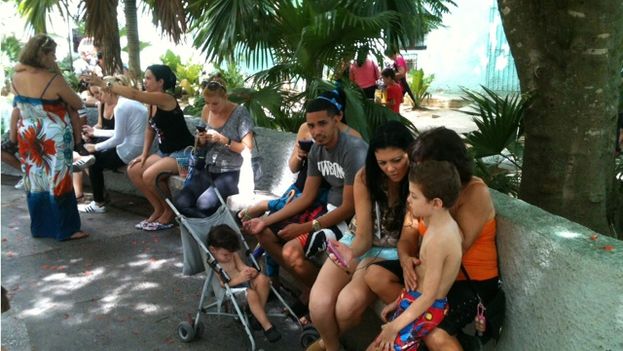
![]() 14ymedio, Juan Carlos Fernandez, Pinar del Rio, 15 July 2015 – For a long time the city of Pinar del Río has languished in the evening. The central Martí Street was a scene of complete desolation and only came alive Saturday with groups of young people wandering aimlessly. However, since early this month, the landscape has changed with the installation of a wireless network to surf the Internet, installed by the State Telecommunications Company of Cuba (ETECSA).
14ymedio, Juan Carlos Fernandez, Pinar del Rio, 15 July 2015 – For a long time the city of Pinar del Río has languished in the evening. The central Martí Street was a scene of complete desolation and only came alive Saturday with groups of young people wandering aimlessly. However, since early this month, the landscape has changed with the installation of a wireless network to surf the Internet, installed by the State Telecommunications Company of Cuba (ETECSA).
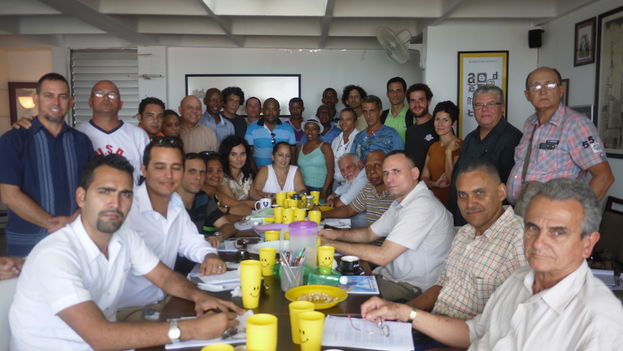


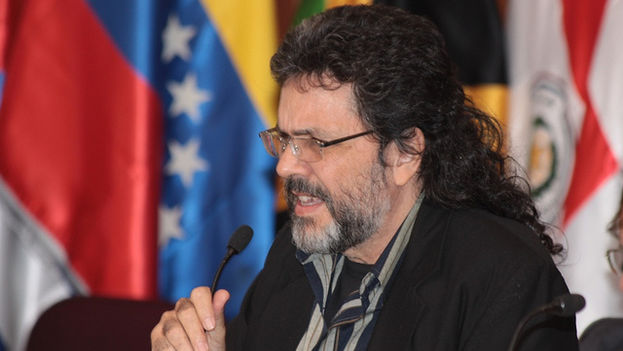

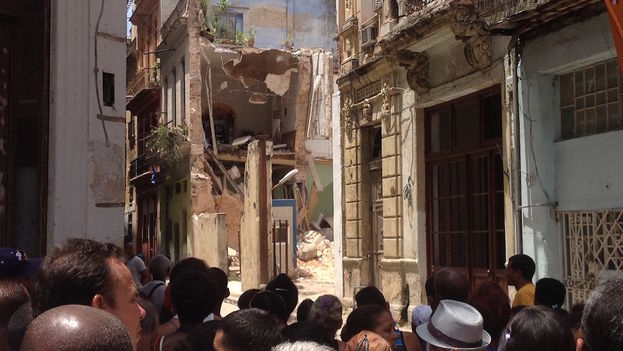

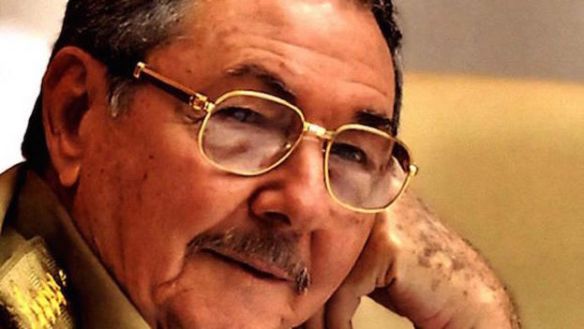
![El Rey se Muere [The King is Dying] (Martinoticias)](https://translatingcuba.com/wp-content/uploads/2015/07/rey-muere-Martinoticias_CYMIMA20150712_0002_16.jpg)

